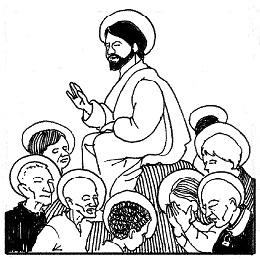
“But I say to you …” (Matt 5:39).
Seventh Sunday in Ordinary Time
Lev 19:1-2, 17-8; Ps 103; 1 Cor 3: 16-23; Matt 5:38-48
We often find the Beatitudes to be otherworldly and too idealistic for practical living. Today’s continuation of the Sermon on the Mount will not make Jesus’ challenge to his disciples seem any easier. What is important to keep in mind is that Jesus is inviting us into a fundamentally different way to think and act in our relationships.
Most Scripture scholars agree that the audience for the Sermon were people living in a culture based largely on honor. You were someone if you asserted your honor, the honor of your tribe, family and social station. To lose honor was to find yourself outside the only support system there was.
Successful people built up their honor by obeying social rules and rising within the ranks of set protocols not unlike today’s business etiquette, or reciprocal duties to return a favor, invite those who have hosted you to a similar meal or event, show signs of gratitude, etc.
We glimpse this quid pro quo world in Jesus’ parables about inviting guests, seating at banquets, showing hospitality, especially when he challenges everyone by breaking the rules, eating with social outcasts, the poor and the sick who cannot reciprocate. It made no sense within an honor culture to lower yourself with losers or to offend important people who could help you advance in status.
Jesus challenged religious and legal perfectionists by teaching that there was more to keeping the Law than just the letter. Not murdering or committing adultery also required us to control our contempt and our lust, a much deeper kind of virtue only the pure of heart possess.
In today’s Gospel, Jesus gets to the heart of the honor identity by telling his disciples to turn the other cheek and go the extra mile, two instances in which powerful people could humiliate those of lesser status. Striking someone in the face was a way to remind a slave, a child or a woman (wife, servant) who was boss. A Roman soldier could by law force a Jew along the road to carry his heavy pack for exactly one mile.
Jesus’s instruction was in fact an effective strategy to challenge the abuser to see his victim as a person of equal dignity by exposing the injustice of his use of force. The backhand blow of the first strike could only be repeated with an open-handed blow if the victim stood his ground and “turned the other cheek.” It would be a blow reserved for a fight between equals. And carrying a soldier’s pack an extra mile changed the relationship from a legal to a personal basis, putting the burden onto the soldier.
Christian pacifism has never been about passivity or just resistance to evil, but a way of disarming the aggressor by exposing injustice or by applying persuasion and even shaming. Gandhi, Dorothy Day and Martin Luther King Jr. understood this perfectly.
The ultimate example of Jesus’ message was to show that God was so powerful that God did not have to protect the divine honor. God is free to pour out his love on both those who obey him and those who do not. The capacity to forgive those who offend us, to show mercy to those who do not deserve it, even reject it, is the ultimate sign we are the children of the Heavenly Father revealed by Jesus.
This is really the goal of this new kind of moral being and behavior, and the only way the world will emerge from its violent ways to see the mutual blessing of making relationships respectful and personal. This is also how we reveal God to one another. It opens us to the freedom and grace God gives to every member of the human family as children of God and brothers and sisters to one another.









